The New Normal for Master-Planned Communities Sales, Marketing, and Management Technology

With every major crisis event, people are quick to claim that the “old normal” is gone and it is time to get on board with the “new normal” to continue to be relevant, along with an abundance of predications about what comprises the “new normal.” But what actually changes and becomes permanent are typically shifts that were already trending, and big disruptions like the current COVID-19 crisis merely accelerate rather than create the need to adapt and change. The technology transformations to MPC sales, marketing, and management preceded the current crisis, but are being greatly accelerated by it, and those who do not adapt will likely find themselves at a competitive disadvantage.
Prior to the social and economic upheaval of the pandemic, there was already a great need to update and improve the consumer experience around homebuying, and those builders and developers who are already utilizing online and virtual technology to make such improvements have had a significant advantage during this period of social distancing. While many builders and developers were already using online and virtual technology to enhance their sales and marketing, those tools are still underutilized in the real estate space. Builders and developers who had previously made investments in technology have been rewarded with less impact on their traffic and sales during this health crisis, and the current crisis has forced other builders and developers still on the fence to revisit their strategies for adopting online and other technology-oriented tools. These tools were widely available before the COVID-19 crisis, but many organizations were still wedded to antiquated marketing practices, whether due to fear that customers wouldn’t adapt, concerns about investing in the wrong technology platform, or simple inertia.
Changes in Marketing
“In my opinion, the COVID-19 crisis has created a leap-frog scenario whereby reluctant users have had to adapt and have now passed the threshold of discomfort with virtual technology” says Laura Cole, Senior Vice President at LWR Communities, LLC, who adds that “you are going to see builders and developers fall behind in this housing recovery if they have not embraced virtual technology and other online tools that facilitate the consumer’s ability to research and purchase from afar.” LWR Communities, LLC are the developers of the top-selling multigenerational community in the country, Lakewood Ranch, in Sarasota, Florida. Over the past several years, Lakewood Ranch has undertaken a sizable restructuring of their marketing program, consolidating three information centers into one Main Street storefront and hiring community specialists with online customer service experience to service more than 75% of prospects and buyers that come from other parts of Florida, the Northeast, and throughout the United States. That investment has paid dividends during COVID as their team shifted efforts entirely online with chat, virtual tours, customized digital maps, and virtual lifestyle programming serving as their most impactful tools. They anticipate that Information Center walk-ins and bus tours (when they return) will continue to be valuable but believe 75% of interactions with customers will occur online. Two years ago, that percentage would have been completely flipped—75% of interactions were face-to-face. The digital advancements by Lakewood Ranch and others result in more thorough research for buyers such that by the time they come to the community they are far down their decision-making path and more prone to take action.
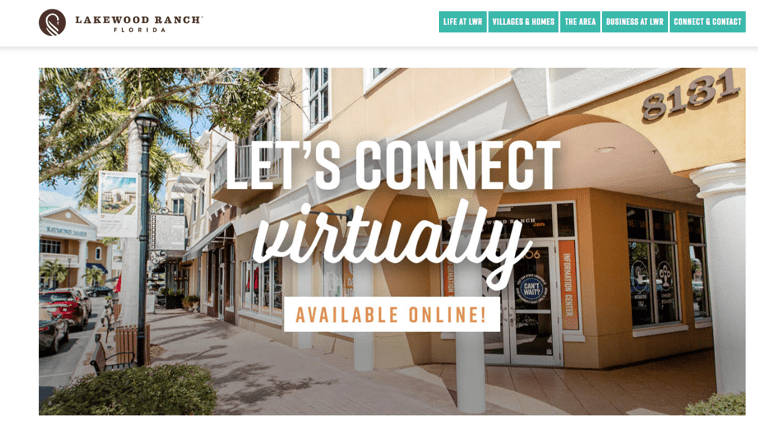
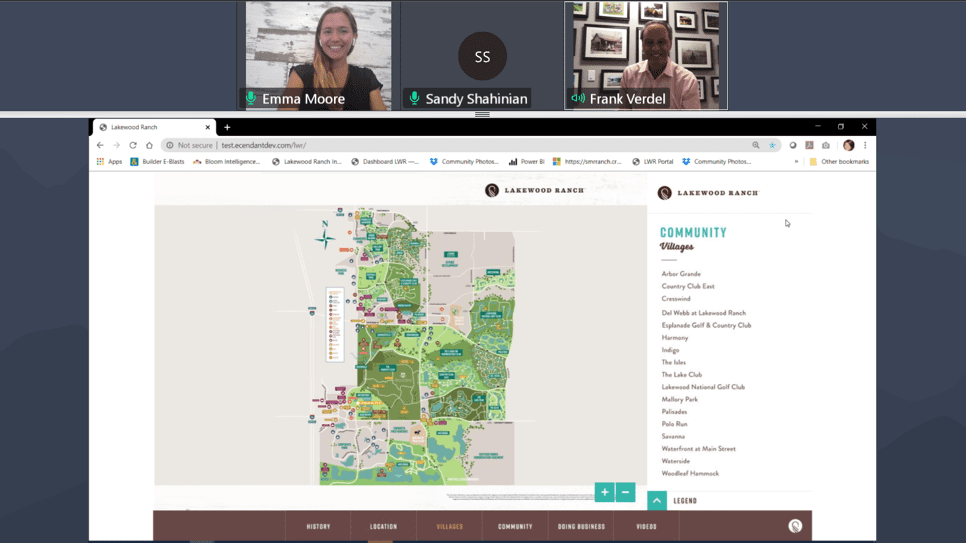
The digital advancements by Lakewood Ranch and others result in more thorough research for buyers such that by the time they come to the community they are far down their decision-making path and more prone to take action.
Changes to the Sales Experience
The current crisis has created more urgency around a pre-existing problem: improving the consumer home- buying experience. Many aspects of traditional homebuying are unpleasant for the consumer. Until recently, buying a home remained an archaic process, while other areas of our lives were dramatically improved by technology, from Zoom meetings to digital banking to ordering a latte from Starbucks. As with all technology, there are the early adopters at one end of the spectrum, those who fail to adapt until it is too late at the other end, and many others in between. Because of the pandemic, more builders, developers, and salespeople have been pushed to adapt sooner than they might have otherwise, simply because other methods were no longer workable. As States re-open, surveys show that a majority of consumers remain wary of returning to “in-person” house-hunting and other “exposure intensive” activities, making those companies that adopt new technologies, such as accommodating self-showings to transacting 100% on-line, more attractive to consumers for their safety as well as their simplicity and ease of use. New technology platforms for residential real estate are also providing greater efficiency to builders and developers, enhancing their overall competitiveness.
When compared to other industries, real estate has been relatively slow to evolve to new ways of doing business. The COVID-19 pandemic has been a wake-up call – in RCLCO’s interviews with dozens of MPC executives about the trajectory of their business the past two months relative to traffic and sales, most commented on the huge uptick in online traffic, touchless sales, and even some sight-unseen virtual home sales. The most successful builders and developers quickly adapted their digital platform to better accommodate their customers’ preference to minimize interpersonal contact in the home-buying and closing process, as well as to conform to State-mandated restrictions.
“In March we set up consumer facing messaging on our website as well as physically onsite through community signage and worked with our builder partners to align sales processes around virtual homebuying” says Cameron Jackson, Director of Marketing for Daybreak Communities, who adds “the pandemic has forced us all to think differently about the future of how we market and sell our homes and communities and has given us an opportunity to rethink the customer experience and bring it into the 21st century.” Daybreak moved fairly quickly to shore up the digital footprint on their website by adding Matterport tours and additional interior imagery of model homes. Matterport virtual tours allow the user to do a 3D walkthrough on their device, as well as experience the floorplan in full VR using inexpensive Google Cardboard technology and their own smart phone.
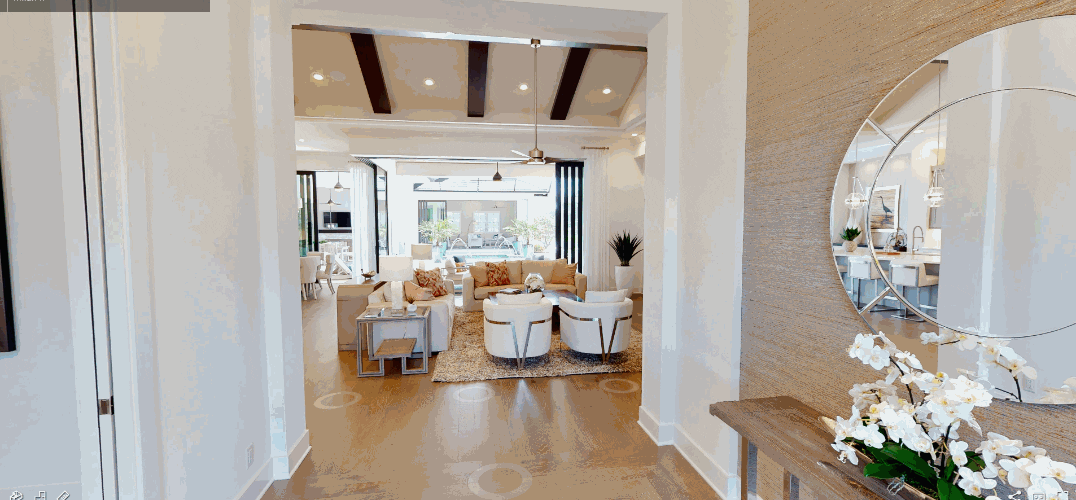
Sample walkthrough of the Matterport virtual tour platform
Heath Melton, Executive Vice President, MPC Residential at The Howard Hughes Corporation, notes that they “acquired our own Matterport camera about 4 years ago and have used it to shoot all of our builder models and even some inventory homes. We provide the files to builders to use as an asset to drive engagement and it has proved to be very effective in increasing the consumer experience of ‘shopping from home’.” At their Bridgeland project, they are utilizing an interactive map that allows the consumer to explore different floor plans and elevations on particular lots from the comfort of their home. By the time they talk to a salesperson, they are more than 70% through the evaluation process before ever stepping foot in a model home, greatly enhancing the consumer journey. Heath believes they will eventually be able to achieve virtual homes sales in a similar fashion to Amazon or Carvana.
Andy Carmody, Managing Director with Tricon Residential, which owns and operates over 21,000 single-family rental homes, reports they “have taken the rental process completely online, where a prospective resident can search our listings on the web, conduct a self-showing, apply and execute a lease online, and even do a remote move-in without ever seeing or speaking to a Tricon associate. While we are welcome to modest personal interaction, particularly to ensure a smooth move-in, it’s no longer required and many new residents prefer this approach.” Carmody also believes that in selling or renting a home, “those who rely on the “old way” are at severe risk in crises like this, and are likely missing out on sales when times are good, too.”
Changes to Management Technology
Well before the COVID-19 pandemic made changing the home-buying experience a requirement, there was great need for improvements to the process. Buying a home is one of the most important decisions a consumer will make in their lifetime, yet the customer experience has largely been lackluster, confusing, time-consuming, and frustrating, and in the age of COVID-19, risky. Furthermore, the interface between developer and builder is often clunky and inefficient, which ultimately lengthens the sales cycle and further erodes the customer home-buying experience. To combat these prevailing issues, Cecilian Partners created a bespoke real estate software platform for community developers that simplifies the management of community development information to both enable a better home-buying experience and provide for more transparent and efficient operations. The XO platform is designed to help communicate with consumers, coordinate sales, manage builder relationships, and view on-demand reports. The technology helps MPC developers organize everything from site plans to sales reports to customer demographics in one secure, accessible, and manageable place. “The new platform saves everyone time – the developer, the builder and the buyer. We have improved connectivity to potential purchasers, near real time reporting data, and quicker approval processes through the inviting and intuitive application. The technology has empowered the buyer with immediate and accurate information to review homesites, pricing and availability and has streamlined design review processes as well,” said Rob Adams, Vice President, Residential Development, Tavistock Development Company. The software provides real-time updates on lot and home inventory, accelerates architectural reviews and approvals, and provides real-time lot availability to builders. It includes a three-dimensional map interface which informs salespeople, management, consumers, builders, and other stakeholders of lot and home availability, permitted floorplans by lot, and allowable color and design schemes. Tony Ruggeri, Co-President of Republic Property Group, uses XO in their Texas community developments, and notes that “in addition to the benefits of a more dynamic customer experience with near real time updates through the consumer facing map, we have seen the XO aide in cleaning and organizing our internal data so it is digestible and more accessible for our team. We have converted a manual and overhead intensive process into one which is automated, saving substantial man hours.” Full disclosure: RCLCO has been so impressed that we have established a formal relationship with Cecilian Partners as we believe their software product, the XO, has substantial benefits for our clients. Contact us to learn more.
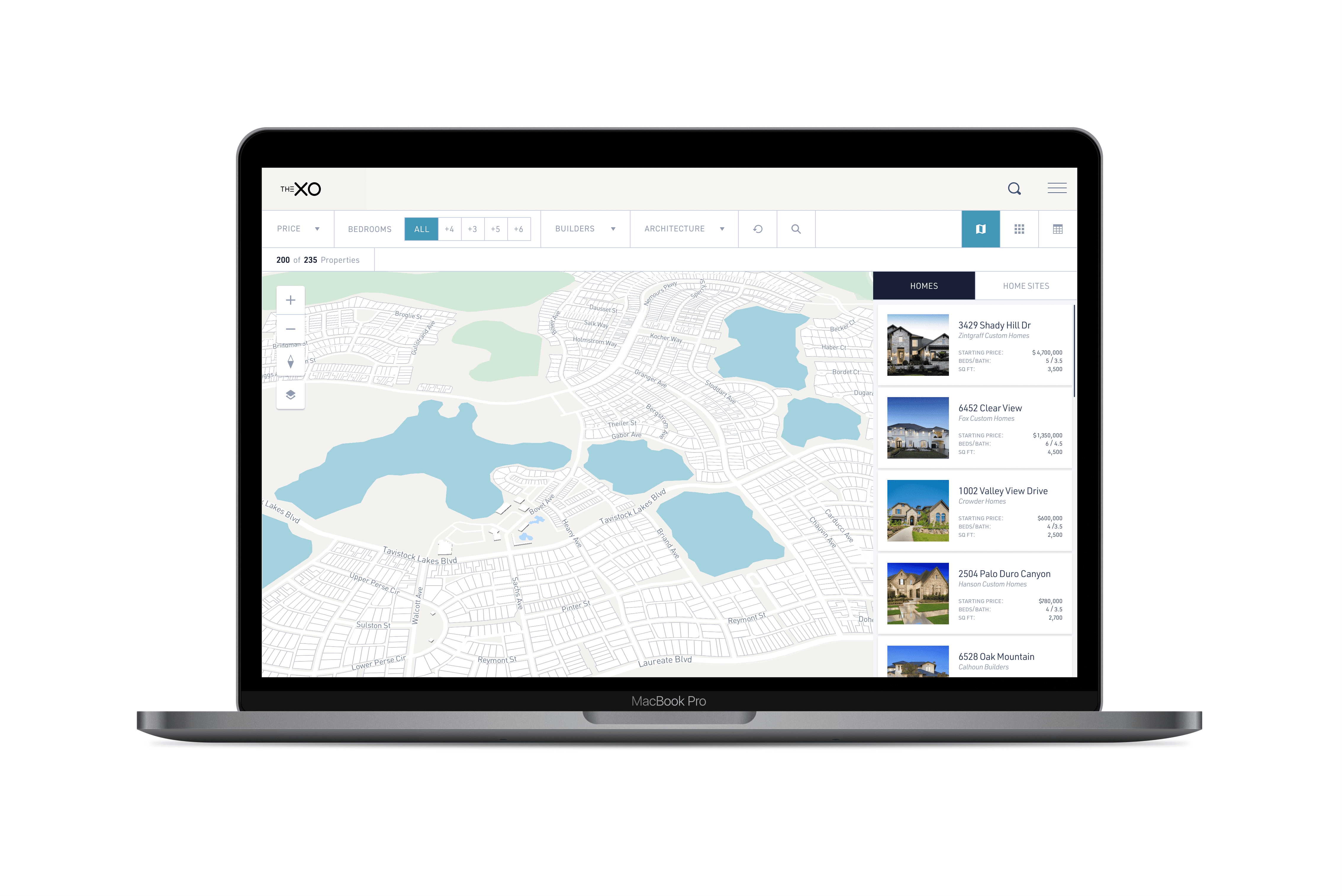
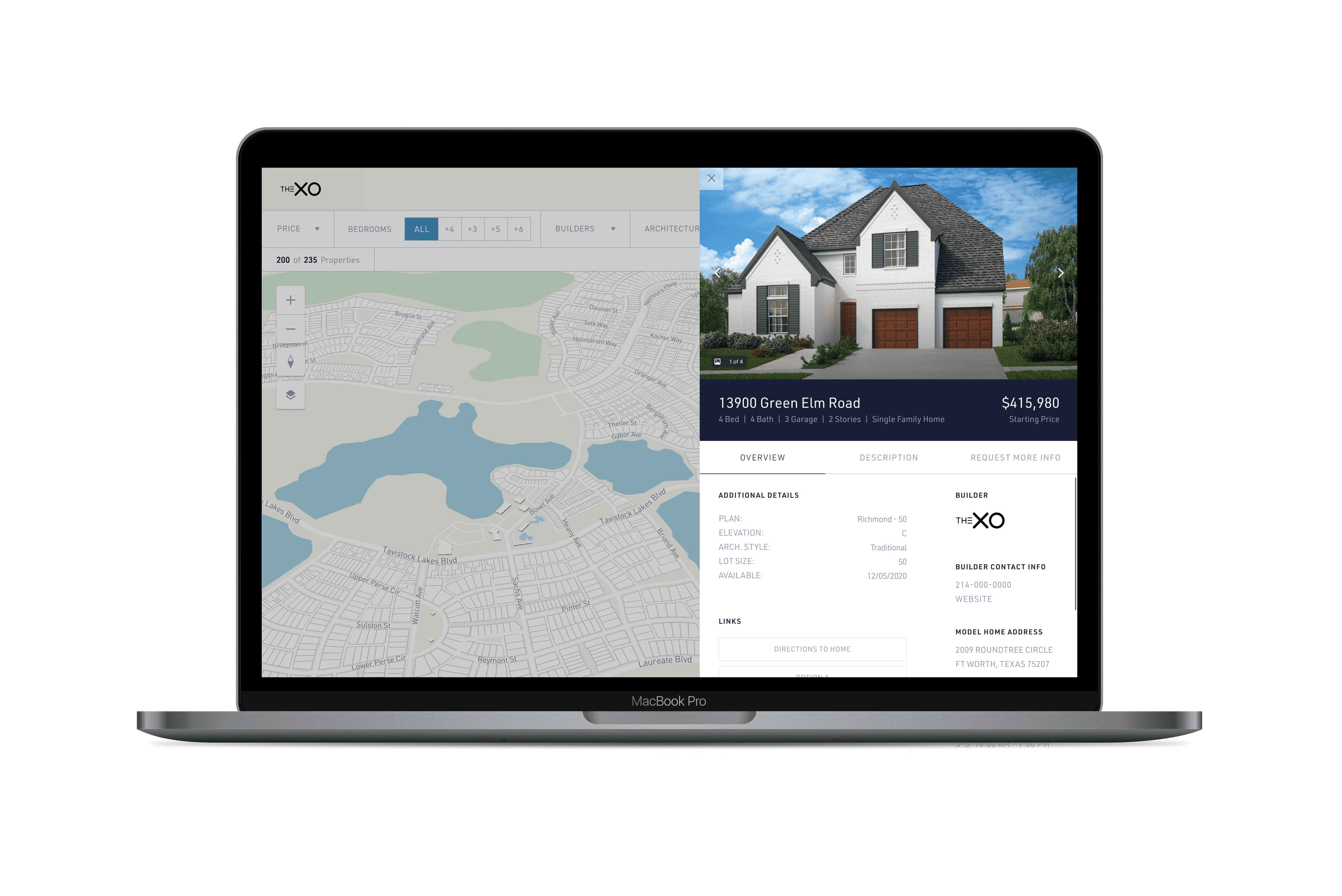
The XO User Interface
RCLCO Senior Managing Director Taylor Mammen observes that “wherever you are on the journey, it’s time to get to the next level on your real estate technology investments. There is no time like the present to do so.” There is a wide range of technology responses across the real estate industry, from those whose investments are revolutionizing their operations, to those who are still operating like they did ten years ago. It’s a good reminder that Darwin did not say it would be the most intellectual or the strongest that survives, but the ones that are best able to adapt and adjust to the changing environment.
Article and research prepared by Gregg Logan, Managing Director, and Todd LaRue, Managing Director.
Disclaimer: Reasonable efforts have been made to ensure that the data contained in this Advisory reflect accurate and timely information, and the data is believed to be reliable and comprehensive. The Advisory is based on estimates, assumptions, and other information developed by RCLCO from its independent research effort and general knowledge of the industry. This Advisory contains opinions that represent our view of reasonable expectations at this particular time, but our opinions are not offered as predictions or assurances that particular events will occur.
Speak to One of Our Real Estate Advisors Today
We take a strategic, data-driven approach to solving your real estate problems.
Contact Us


